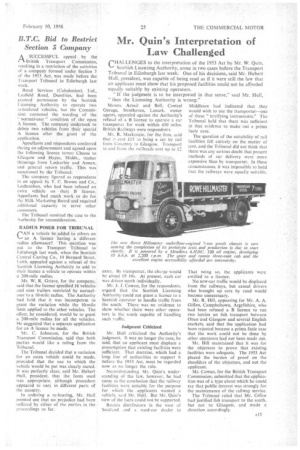Mr. Quin's Interpretation of Law Challenged
Page 17

If you've noticed an error in this article please click here to report it so we can fix it.
CHALLENGES to the interpretation of the 1953 Act by Mr. W. Quin, Scottish Licensing Authority, arose in two cases before the Transport Tribunal in Edinburgh last week. One of his decisions, said Mr. Hubert Hull, president, was capable of being read as if it were still the law that an applicant must show that his proposed facilities could not be afforded equally suitably by existing operators.
"if the judgment is to be interpreted in that sense," said Mr. Hull, "then the Licensing Authority is wrong."
Messrs. Arneil and Bell, Central Garage, Strathaven, Lanark, motor agents, appealed against the Authority's refusal of a B licence to operate a car transporter for work within 450 miles. British Railways were respondents.
Mr. R. Mackenzie, for the firm, said that it cost £15 to bring a car by rail from Coventry to Glasgow. Transport to and from the railheads cost up to ,£2
extra. By transporter, the Charge would be about £9 10s. At present, each car was driven north individually.
Mr. J. J. Cowan, for the respondents, argued that the Scottish Licensing Authority could not grant a licence to a Scottish operator to handle traffic from the south. There was no evidence to show whether there were other operators in the south capable of handling such traffic.
Judgment Criticized
Mr. Hull criticized the Authority's judgment. It was no longer Ole case, be said, that an applicant must displace a presumption that existing facilities were sufficient. That doctrine, which had a long line of authorities to support it before the 1953 Act, must be regarded now as no longer the rule.
Notwithstanding Mr. Quin's understanding of the law, however, he had come to the conclusion that the railway facilities were suitable for the purpose for which the • applicants wanted a vehicle. said Mr. Hull. But Mr. Quin's view of the facts could not be supported.
Rootes distributors in the west of Scotland and a used-car dealer in Middlesex had indicated that they would wish to use the transporter—one of these "terrifying instruments." The Tribunal held that there was sufficient in that evidence to make out a prima facie case.
The question of the suitability of rail facilities fell entirely on the matter of cost, and the Tribunal did not think that there was any serious doubt that present methods of car delivery were more expensive than by transporter. In these circumstances, it wai impossible to hold that the railways were equally suitable.
That being so, the applicants were entitled to a licence.
No new-car traffic would be displaced from the railways, but casual drivers who brought up cars by road would become unnecessary.
Mr. R. Hill, appearing for Mr. A. A. Giffen, Campbeltown, Argyllshire, who had been refused a B licence to run two lorries on fish transport between Oban and Glasgow and several English markets, said that the application had been rejected because a prima facie case that the work could not be done by other operators had not been made out.
Mr. Hill maintained that it was for the objectors to prove that existing facilities were adequate. The 1953 Act placed the burden of proof on the shoulders of the objectors, and not the applicant.
Mr. Cowan, for the British Transport Commission, submitted that the application was of a type about which he could say that public interest was strongly for the maintenance of the railway service.
The Tribunal ruled that Mr. Giffen had justified fish transport to the south, but not to Glasgow, and made a direction accordingly.












































